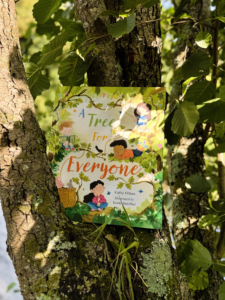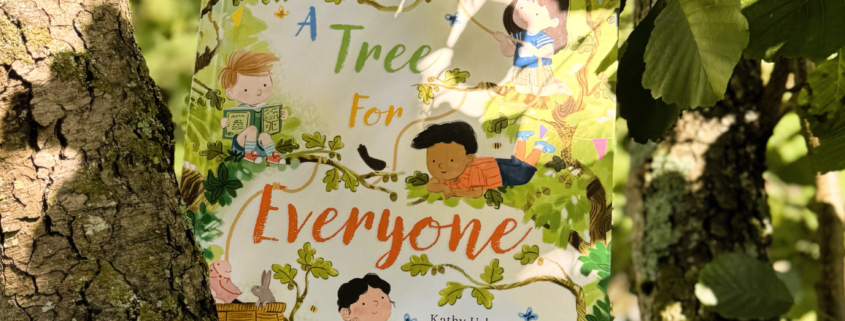A Tree for Everyone by Kathy Urban
We welcome Kathy Urban to the blog today sharing her opinion on Why Play Matters! It may help you to remember your own fond memories of playing as a child.

Why Play Matters: Play is messy — and that’s a good thing By Kathy Urban
I must have been about eight years old that summer when my friends and I spent most of our time playing in this incredible old tree we’d found: a tree made for afternoon adventures.
We’d even managed to fit it with our very own two-storey treehouse, a makeshift creation really built from scraps of wood and whatever else we could get hold of. To us, though, it was perfect.
I still remember all the fun we had high up in that tree. I also remember the moment when everything went wrong and the regret over how I handled myself in that situation.
A Tree for Everyone, my latest children’s book, was born out of those childhood memories and from my firm belief that the best learning happens when things turn messy. It tells the story of two groups of children arguing over their beloved oak tree. Things get so heated that eventually the treehouse one group had built breaks, not because any of them meant for that to happen, but because that’s where unchecked conflict led.
‘And then one cloudy morning, another team of adventurers arrived.
Now there were six of them. But only room for three.’
Kids can be fiercely territorial. The idea of sharing doesn’t always come easily, and it can turn, as the story shows, into a regrettable situation.
Yes, play can be messy. It’s raw. Unstructured. Loud. Chaotic. Emotional. It can make you, as the watching grown-up, want to pull your hair out. But there’s a silver lining: because inside that mess, real learning happens.
Looking back, I realise how much that summer taught me about reflecting on my own actions and understanding that owning up to mistakes can sometimes offer second chances. Whether in the playroom, the schoolyard, or up in a tree, play gives children the space to rehearse who they are becoming: to test boundaries, to argue, to fall out, to negotiate, and eventually (and hopefully) to reflect and repair.
As parents, we often rush to step in to remind our children to share, to take turns, to offer a quick ‘sorry’ to make things right. I admit that as a mum of three, and for the sake of peace, I’ve been in that situation all too often. The intention is good, but when we tidy away every moment of friction, don’t we risk sanitising the very experiences that help our children develop empathy and accountability?
As questions continue in England about whether play-based learning should remain part of the Key Stage 1 classroom, I’d argue play isn’t a break from learning. It is learning. There’s order in the chaos. Years later, when our family lived in Denmark, I saw that unstructured play was simply part of everyday life across all ages. Having come from more structured early-years settings elsewhere, I found myself hesitating initially until one parent smiled and reassured me, “Don’t worry, Kathy. They’ll turn out just fine.” And she was right. Not despite the mess, but because of it.
In the story, the children eventually rebuild and repair after taking time to reflect on what happened. They discover that real apology and compromise not only open the door to new friendships, but that sharing their tree isn’t such a bad thing after all.
We don’t become kind because someone scripts kindness for us. We become kind because life gives us imperfect moments, and we learn from them by navigating its messy tracks. I wouldn’t want my – or indeed any – children to miss out on these.
‘For a time, they were silent. But within that silence, Jake felt something starting to move. Ever so gently, ever so quietly, like a tiny whisper that grew and grew inside. It found its way up … and out at last. “I am sorry about what happened,” Jake said. And he was. He really was. All the way from the bottom up.’
Views expressed do not necessarily reflect those of the Federation.



